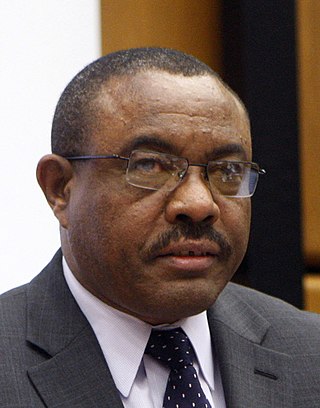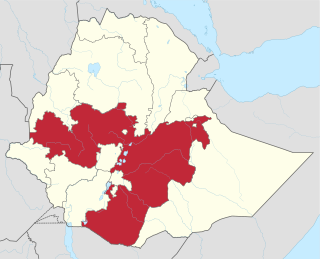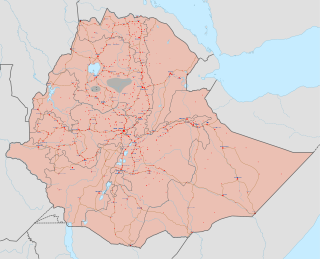| |||||
| Decades: | |||||
|---|---|---|---|---|---|
| See also: | Other events of 2005 Timeline of Ethiopian history | ||||
The following lists events that happened during 2005 in Ethiopia .
| |||||
| Decades: | |||||
|---|---|---|---|---|---|
| See also: | Other events of 2005 Timeline of Ethiopian history | ||||
The following lists events that happened during 2005 in Ethiopia .

The politics of Ethiopia are the activities associated with the governance of Ethiopia. The government is structured as a federal parliamentary republic with both a President and Prime Minister. The legislature is multicameral, with a house of representatives and a council. The term politics of Ethiopia mainly relates to the political activities in Ethiopia after the late 20th century when democratization took place in the nation. The current political structure of Ethiopia was formed after the Tigrayan People's Liberation Front (TPLF) overthrew dictator President Mengistu Haile Mariam in 1991. A general election was held in June 1994 and Ethiopia has maintained a multiparty political environment till today.

Meles Zenawi Asres (Tigringa and Amharic: መለስ ዜናዊ ኣስረስ; pronounced[mɛllɛszenawiasrɛs], born Legesse Zenawi Asres was an Ethiopian soldier and politician who served as President of Ethiopia from 1991 to 1995 and then Prime Minister of Ethiopia from 1995 until his death in 2012.

Under the current constitution, Ethiopia conducts local, regional, and federal elections. At the federal level, Ethiopia elects a legislature. The Federal Parliamentary Assembly has two chambers: the House of People's Representatives with not more than 550 members as per the constitution but actually nearly 547 members, elected for five-year terms in single-seat constituencies; and the Council of the Federation with 117 members, one each from the 22 minority nationalities, and one from each professional sector of its remaining nationalities, designated by the regional councils, which may elect them themselves or through popular elections.

General elections were held in Ethiopia on 15 May 2005, for seats in the House of Peoples' Representatives and four regional government councils. Under pressure from the international community, Prime Minister Meles Zenawi promised that this election would be proof that more democracy would come in this multi-ethnic nation; international elections observers from the European Union (EU) and the U.S.-based Carter Center were present to observe the results. This election succeeded in attracting about 90% of the registered voters to the polls. A government ban on protests was imposed throughout the election period.

The Coalition for Unity and Democracy, commonly referred to by its English abbreviation CUD, or occasionally CDU, was a coalition of four existing political parties of Ethiopia which combined to compete for seats in the Ethiopian General Elections held on May 15, 2005, and around the end of that year, became a full-fledged political party. Its leader was Hailu Shawul and the political party was dissolved in 2007.

According to the U.S. Department of State's human rights report for 2022, there exists "significant human rights issues" in Ethiopia. In addition to extrajudicial killings and instances of "enforced disappearance", other human right issues in Ethiopia include arbitrary arrest, the censorship and unjustified arrests of journalists, the use of child soldiers, and more.

Hailemariam Desalegn Boshe is an Ethiopian politician who served as prime minister of Ethiopia from 2012 to 2018. He also previously served as deputy prime minister and Minister of Foreign Affairs under Prime Minister Meles Zenawi from 2010 to 2012. After Meles' death in August 2012, Hailemariam succeeded him as prime minister, initially in an acting capacity. He was then elected as the chair of the EPRDF, the ruling party, on 15 September 2012. Hailemariam also served as the chairperson of the African Union from 2013 to 2014.
The 2005 Ethiopian general election violence, known generally as the Ethiopian police massacre, refers to the killing of civilians by government forces during June and November 2005 which led to the deaths of 193 protesters and injury of 763 others, mostly in the capital Addis Ababa, following the May 2005 elections in Ethiopia. More than 30,000 people were detained by security forces following the election, most released in 2006.
Lidetu Ayalew is an Ethiopian politician who is the founder and the leader of the Ethiopian Democratic Party. He was a deputy chairman and chief spokesperson of Coalition for Unity and Democracy (CUD), during the 2005 Ethiopian general election.

The Transitional Government of Ethiopia (TGE) was an era established immediately after the Ethiopian People's Revolutionary Democratic Front (EPRDF) seized power from the Marxist-Leninist People's Democratic Republic of Ethiopia (PDRE) in 1991. During the transitional period, Meles Zenawi served as the president of the TGE while Tamrat Layne was prime minister. Among other major shifts in the country's political institutions, it was under the authority of the TGE that the realignment of provincial boundaries on the basis of ethnolinguistic identity occurred. The TGE was in power until 1995, when it transitioned into the reconstituted Federal Democratic Republic of Ethiopia that remains today.
The following lists events that happened during 2007 in Ethiopia.

The 2014–2016 Oromo protests were a series of protests and resistance first sparked on 25 April 2014. The initial actions were taken in opposition to the Addis Ababa Master Plan, and resumed on 12 November 2015 by university students and farmers in the town of Ginchi, located 80 km southwest of Addis Ababa, encircled by the Oromia region. The plan was to expand the capital into the Oromia special zone, leading to fears that native Oromo farmers would lose their land and be displaced. The plan was later dropped but protests continued, highlighting issues such as marginalization and human rights. Mulatu Gemechu, deputy chairman of the opposition Oromo Federalist Congress, expressed to Reuters: "so far, we have compiled a list of 33 protesters killed by armed security forces that included police and soldiers but I am very sure the list will grow". Protesters demanded social and political reforms, including an end to human rights abuses like government killings of civilians, mass arrests, government land seizures, and political marginalization of opposition groups. The government responded by restricting access to the internet and attacking as well as arresting protesters.
The following lists events that happened during 2001 in Ethiopia.
Events of 2019 in Ethiopia.
The Burayu massacre was a series of communal clashes which occurred in the vicinity of the Ethiopian town of Burayu, in the Oromia Region, on 14–16 September 2018. Individuals from the Oromo and Dorze ethnicities fought in and around Burayu, a town in Oromia Region which is located near the northwest boundary of Addis Ababa, the federal capital. Different sources cite number of civilians killed both from Oromo and non-Oromo ethnicity.

A October 2019 Ethiopian clashes was a civil unrest that broke out in Addis Ababa, on 23 October 2019 and swiftly spread to entire Oromia Region after activist and Director of Oromia Media Network, Jawar Mohammed reported on his Facebook page around midnight, on Tuesday. In his post, Jawar has said that his house was surrounded by police officers and that they tried to withdraw his security guards from their posts. His VIP security detail was assigned to him by the government once he arrived from the US. According to official reports, 86 people were killed, 76 were killed by Communal violence, while 10 were security forces of Ethiopia.

The Hachalu Hundessa riots were a series of civil unrest that occurred in the Oromia Region of Ethiopia, more specifically in the hot spot of Addis Ababa, Shashamene and Ambo following the killing of the Oromo musician Hachalu Hundessa on 29 June 2020. The riots lead to the deaths of at least 239 people according to initial police reports. Peaceful protests against Hachalu's killing have been held by Oromos abroad as well. The Ethiopian Human Rights Commission (EHRC) found in its 1 January 2021 full report that part of the killings were a crime against humanity, with deliberate, widespread systematic killing of civilians by organised groups. The EHRC counted 123 deaths, 76 of which it attributed to security forces.

Following the 2018 dissolution of the ethnic federalist, dominant party political coalition, the Ethiopian People's Revolutionary Democratic Front, there was an increase in tensions within the country, with newly resurgent regional and ethnically based factions carrying out armed attacks on military and civilians in multiple conflicts throughout Ethiopia.
The 1995 Ethiopian Federal Constitution formalizes an ethnic federalism law aimed at undermining long-standing ethnic imperial rule, reducing ethnic tensions, promoting regional autonomy, and upholding unqualified rights to self-determination and secession in a state with more than 80 different ethnic groups. But the constitution is divisive, both among Ethiopian nationalists who believe it undermines centralized authority and fuels interethnic conflict, and among ethnic federalists who fear that the development of its vague components could lead to authoritarian centralization or even the maintenance of minority ethnic hegemony. Parliamentary elections since 1995 have taken place every five years since enactment. All but one of these have resulted in government by members of the Ethiopian People's Revolutionary Democratic Front (EPRDF) political coalition, under three prime ministers. The EPRDF was under the effective control of the Tigray People's Liberation Front (TPLF), which represents a small ethnic minority. In 2019 the EPRDF, under Abiy, was dissolved and he inaugurated the pan-ethnic Prosperity Party which won the 2021 Ethiopian Election, returning him as prime minister. But both political entities were different kinds of responses to the ongoing tension between constitutional ethnic federalism and the Ethiopian state's authority. Over the same period, and all administrations, a range of major conflicts with ethnic roots have occurred or continued, and the press and availability of information have been controlled. There has also been dramatic economic growth and liberalization, which has itself been attributed to, and used to justify, authoritarian state policy.

Police brutality in Ethiopia falls under the aegis of the Ethiopian Federal Police (EFP), which has responsibility for safeguarding civil law and abiding the country's constitution under Proclamation 2000, 2003 or 2011. Under Federal Police Officer Administration Regulation of 2012, dual obligation is promulgated to reinforce the law that every police officers should respect international human rights instructions and legal liability.